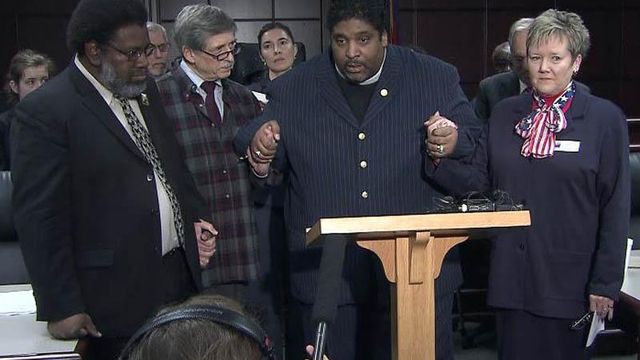Another NC redistricting lawsuit filed in Raleigh
A second legal challenge to new maps for North Carolina's legislative and congressional seats says the boundaries go beyond what the law requires to protect black voters and actually harms them.
Posted — UpdatedLawyers for four groups and 27 registered voters sued in Wake County Superior Court, less than 24 hours after Democratic elected officials and voters filed similar litigation in the same court in Raleigh.
"We will not allow North Carolina to be politically re-segregated," said Rev. William Barber, state president of the NAACP. "We will never go back, and we shall not be moved."
The two lawsuits makes very similar allegations: The boundaries approved in July by the legislature for the state House, Senate and congressional delegation illegally cluster black voters to decrease their overall electoral power statewide and to divide communities. The districts lines cross too many county boundaries, and more than 500 voting precincts are split, affecting 2 million adults, the lawsuits contend.
"The number of split precincts is unprecedented and far exceeds alternative plans that comply with federal and state law," the lawsuit reads. "They have the design and effect to segregate voters by race."
According to the lawsuit, black voters are 50 percent more likely to live in a split precinct than white voters. One street in Durham, for example, has four different ballots in one block.
Splitting precincts makes political organizing more difficult and makes voting take longer because there are so many different ballots. That requires more staff, more training and more money.
Republicans have countered that the federal Voting Rights Act demands that they draw majority-black districts whenever feasible and that federal attorneys have suggested that restricting the splitting of precincts actually could reduce for black voting power. But the authors of Friday's lawsuit say Republicans have misconstrued the Voting Rights Act deliberately for their own political benefit.
The boundaries are "an intentional and cynical use of race that exceeds what is required to ensure fairness to previously disenfranchised racial minority voters," the lawsuit read. "The plans violate North Carolina voters' rights to equal protection under the law by assigning voters to districts based on their race beyond what is required by the Voting Rights Act."
"This is serious business," Barber said. "It goes right to the heart of our democracy. Our democracy should look like this. it should not be driven by these ideological, race-based schemes to re-segregate voters."
The plaintiffs want a three-judge panel to prevent the maps from being used starting with the 2012 election and tell the Republican-led majority to try again so that they comply with the state and federal constitutions. Otherwise, the 96-page lawsuit reads, the court should adopt its own plans that pass muster.
Plaintiffs include the NAACP, the League of Women Voters of North Carolina, the union-affiliated A. Philip Randolph Institute and Democracy North Carolina.
The two lawsuits were filed just after U.S. Department of Justice attorneys said they wouldn't oppose the maps on the basis of certain racial discrimination grounds – giving Republicans a significant legal victory.
Sen. Bob Rucho, who led the legislative panel that drew the district maps, said the federal approval makes the racial argument in the two lawsuits moot.
"We drew fair and legal maps, and we followed the letter of the law," said Rucho, R-Mecklenburg. "We will win those lawsuits."
A three-judge panel, chosen by North Carolina Chief Justice Sarah Parker, will hear the challenges filed in state court. The cases could wind up at the state Supreme Court, as the maps drawn following the 2000 Census did – that time a Republican lawsuit over boundaries drawn by Democrats.
• Credits
Copyright 2024 by WRAL.com and the Associated Press. All rights reserved. This material may not be published, broadcast, rewritten or redistributed.






